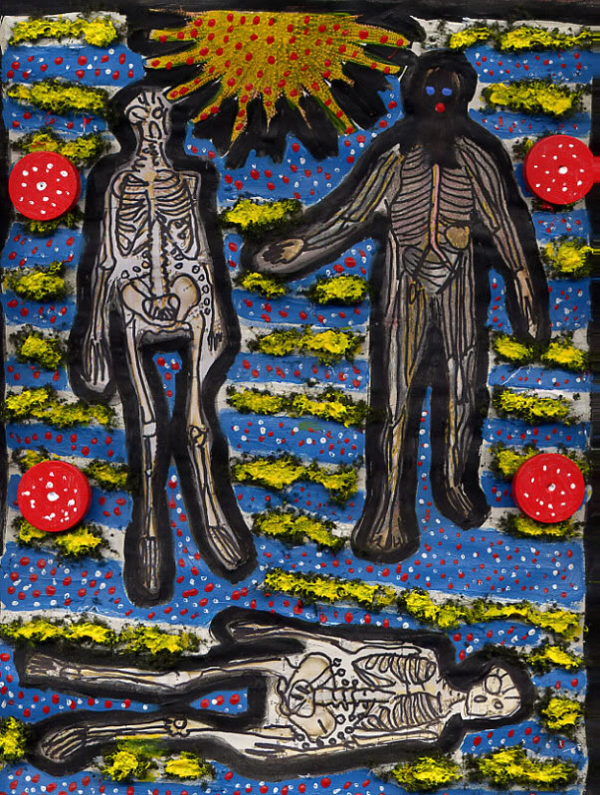contradiction
by Anna Bigelow

I once had a landlord who was an arch Republican with signed pictures of various Republican figures (George W. Bush, Jesse Helms, Ronald Reagan) on his walls. He was also an avid dowser, past-life regresser, and astral projector. He cured the neighbor’s apple tree of a worm infestation, found people’s lost objects over the phone, and attempted to heal my terror of snakes through a visualization technique that involved repetition and tapping on my sternum (the last one didn’t work and can’t speak to the second, but there weren’t worms in the apples when I lived there). He was an aficionado of conspiracy theories, a veritable archivist. I have never had so much fun talking to anyone with whom I disagreed so much. He was a truly marvelous person. But every time I try to describe the man to someone, the story is met with wonderment that a person could be both a conservative and a new age mage. Some sort of inauthenticity is implied in the discomfort. Yet why should it be so? What is our anxiety about dissonance? What is the landlord out of tune with but our own conceptions of harmony?
Explaining the unexplainable is a favorite human pastime. Semi-regular emails appear in my inbox from individuals who claim to see things as they really are in relation to whatever issue they place at the center of their universes—the Bosnian Pyramids of the Sun (suppressed by Egypt’s Department of Antiquities so they can monopolize the tourist trade), the hidden evil of the Council on American Islamic Relations (a front for a variety of anti-American, terrorist entities), the scourge of Muslim population growth (set to overtake the 80% Hindu majority in India in a matter of fifty years), and so on. Today’s missive encouraged me to explore the Illuminati Bohemian Grove Freemason connection, which no doubt would reveal the complex system of puppet strings being pulled by a cabal of puppeteers hiding in plain sight. A paleontologist friend gets emails from dinosaur aficionados who believe the paleontological establishment is bent on repressing the truth about dinosaurs, the environment, coexistence with humans, and so on. Not to mention the creationist vision of Jesus cradling a baby T-Rex… those were the days.
Grand explanatory schemes share certain qualities with conspiracy theories. Both seek to fulfill both our need to understand and our need to be mystified. I was in India, living in a Muslim majority community, when the World Trade Towers were brought down on September 11, 2001. Or were they? Shortly after the horrifying spectacle began to unfold, people of all faiths, all classes, all sorts began to approach me, suggesting various alternative explanations for the unimaginably terrifying collapse of the huge structures and the devastatingly tiny bodies that showered down in an endless loop on every channel. Many conspiracy theories emerged (it was all staged, no Jews showed up to work that day, the US government was the real culprit, Muslims were framed, Muslims hate freedom, etc. etc.), all transcending the evidentiary but fulfilling a need to try to explain. I don’t believe that the WTC and Pentagon attacks of 2001 are unaccountable at all, but it is clear that for many the simple is insufficient, the self-evident is inadequate. Reality is just too, well, real. Or maybe it is as Clifford Geertz suspected, that in situations that defy human experience or conception, speculation reassures us of the human capacity to eventually arrive at understanding. If we can propose solutions to a riddle (and what is more puzzling than the way things actually are) then we are also asserting our ability, maybe as yet unrealized, to comprehend all phenomena perfectly. But speculation can go awry, re-enchanting the disenchanted.
Does one reduce the pervasion of conspiracy theories to the need to understand and control a seemingly meaningless and random world? Yes and no. Or maybe. Of course reductionism is anathema to the scholar, but it is tempting to the citizen baffled by the absurdities that pass for explanations and the number of people who seem confident of President Obama’s foreign, Muslim birth. Where do “they” come from, these people… how did they get that way? And so we concoct our own conspiracy theory about the conspiracy theorists—they are crypto-racists, birther-xenophobes, libertarian technophobes. Ostensibly in search of rational explanations, believers may fix on the most illogical, most improbable available. It calls to mind Hume’s view of the perversity of most religious believers who ignore the rational beauty of nature and choose instead to construct religions that depend upon fear, superstition, and capriciousness, “Survey most nations and most ages. Examine the religious principles, which have, in fact, prevailed in the world. You will scarcely be persuaded, that they are any thing but sick men’s dreams.” But through these dreams the rationalized world is re-enchanted. A conspiracy provides a key to a mystery that, even as it unlocks, obfuscates. Contradictions both acquaint us with the stable, familiar episteme in which we are comfortable, and reminds us of how tedious it would be if we existed in absolute purity. Indeed, contradictions are in the eyes of the beholder. My landlord was not riddled with anxiety about being a conservative and a dabbler in occult sciences—I was. I was the one who had to explore my own confusion and interrogate my own surprise. The instinct to seek a key to unlock the mystery is a reflection of an inability, closer to home, to account for his hybridity, eccentricity, and imaginative playfulness. The more we dismiss such lifeways as kooky, the more we impoverish our ability to actually make such accountings of the unexpected. Check your inbox.